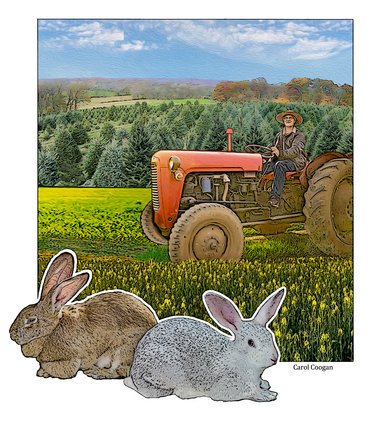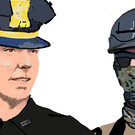Jan Van Etten used common sense for the common good
When Jan Van Etten’s daughter submitted her mother’s obituary last week, she told me, “It is the end of an era and she was truly one of a kind.”
Both of these things are true.
Mrs. Van Etten was born in the Great Depression and raised in an era when a woman’s sphere was the home — being a helpmate to her husband, raising their children, and contributing to the church and community as a volunteer.
Mrs. Van Etten fulfilled all those roles — but in her own way, as one of a kind.
Twelve years ago, when Mrs. Van Etten was 76, I wrote about her being first in the nation for showing Flemish rabbits. Her success at raising rabbits was part of her quest for independence.
“I wanted to be a veterinarian because I love animals,” Mrs. Van Etten told me then. “I couldn’t be one. The next thing was to marry a farmer. Then we had animals, but they weren’t mine. I was somebody’s wife or mother, not me.
“These are Jan’s rabbits; they’re mine,” she said as she introduced me to her rabbits.
As students at Cornell’s agricultural college, she and her husband, George Van Etten, were paired as lab partners in a “Feed and Feeding” class.
“I kind of looked him over, and he didn’t look too bad,” Mrs. Van Etten told me, with a laugh, when I was writing her husband’s obituary in 2009. She then found out where and when his classes met and arranged to cross his path.
“It was kind of mutual,” she said about their growing affection.
After two years at Cornell, Mr. Van Etten joined the United States Army and served a two-year hitch.
“He got out in December and we married in April,” said Mrs. Van Etten. That was in 1957.
The couple lived on one salary and saved the other so they could realize their dream of buying a farm. He worked for the phone company as a linesman.
“When I got pregnant, George said, ‘I want you to stay home.’ We could manage on his salary,” said Mrs. Van Etten.
In 1959, the Van Ettens traveled up the Hill to Knox in an old Model T to look at a farm for sale.
“We went putt, putt, putt up the hill to God’s country, God being the only one that wanted it,” said Mrs. Van Etten with her typical dry humor.
The Van Ettens purchased the 200-acre property with a barn and two houses for $11,500.
Twenty-one years later, they added another 100 acres of land that lay between their two parcels. “George said he put the farm back together,” said Mrs. Van Etten.
The idea for a Christmas tree farm was born because, said Mrs. Van Etten, “We had land that was not good for planting; it was rocky with very little soil.”
So the Van Ettens planted 50 acres of tiny trees that would grow to grace family rooms and parlors throughout the Capital Region.
“He always said, ‘You never plant more trees than your wife can shear.’ He always called me his branch manager,” said Mrs. Van Etten.
Although her husband had initially wanted to be a chicken farmer, feed was too expensive, Mrs. Van Etten said, so they raised beef cattle instead. The cattle could eat for free in the summer and, in the winter, they ate hay the Van Ettens bailed.
“George told me, ‘Women can’t drive tractors,’ so I was on the wagon, dragging the hay from front to back and stacking it….Then I saw Pauline Gaige driving a tractor. I told George, ‘Get in the car.’”
Mrs. Van Etten took Mr. Van Etten to see a woman driving a tractor. “I said, ‘I’m going to ask her husband, who is also George, if he’s lost his penis — the most important thing to a man,’” recalled Van Etten. She told her husband, “George, you have to use your muscles to the best advantage.”
After that, Jan Van Etten drove the tractor while her husband hauled and stacked the bales.
Her next task, after the Van Ettens’ children had grown some, was to convince her husband that she could use her education to go to work. “I wanted to work at the school to get enough money to feed rabbits,” Mrs. Van Etten recalled.
So, when her husband came home from work one day, expecting, as usual, to find a hearty dinner cooking on the stove, he instead found his wife seated at the head of the kitchen table with the remains of a dead mole spread out on the table, preparing to stuff it for mounting.
“There was no smell of dinner when he got home and he said, ‘What are you doing?’” I said, ‘Today, I got to use my college education.’ He was a hard-headed Dutchman,” she said with a laugh.
So, after that, Mrs. Van Etten worked at least one day a week, for $45, as a substitute teacher at Berne-Knox while still tending to her children and farm duties.
She also contributed a lot to the community.
While she reported her husband always said, “I meet my god in my fields,” and was often in his fields on Sunday, Mrs. Van Etten had a strong Christian faith and held every office at the Knox Reformed Church. “And even preached there,” her family said in her obituary.
Mrs. Van Etten was also a 4-H leader. Her farmhouse was lined with trophies she’d won over the years, showing her rabbits. She taught her 4-H charges how to successfully show rabbits and said of her trophies, “I’m recycling them, giving them to kids at the Altamont Fair.”
As president of the Helderberg Kiwanis, Mrs. Van Etten wrote — among many letters to the editor over the years — one letter about a Memorial Day parade that had the theme “Honoring our Heroes.”
As chairwoman of the parade, Mrs. Van Etten wrote, “When I thought of all the heroes we have, I honor our boys who go to far-off lands to keep us safe. I think of the heroes who drove the ambulance that came when I called to take my husband to the hospital.
“I have lived in these mountains for almost 50 years and the Knox firemen have saved my home twice when the chimney caught fire. America is great because neighbors come to the aid of their neighbors.”
We like that ideal — that the greatness of our country lies in helping one another — and it was an ideal Mrs. Van Etten may have embodied from an earlier era but carried forward in her own way.
She did not wallow in grief or self-pity when she had to endure perhaps the worst fate a mother can suffer — the death of her child. I found this out when, as a young mother myself, I saw Mrs. Van Etten’s phone number in The Enterprise as the person to call to host a Fresh Air child.
The Van Ettens had first taken a Fresh Air Fund child into their home when their own child died. “Our first little boy died, and I missed having a little guy around,” said Mrs. Van Etten. “So, I took a Fresh Air kid, a little boy. I took two the next year … We went on from there.”
She kept up that worthwhile work, bringing others along with her, for nearly half of a century.
Every year, she would send a letter to the editor, seeking families “who will open their homes to a New York City child, aged 6 to 12 … You only need to provide them a bed and treat them as a member of your family,” she wrote, ending with a Biblical thought: “Our Lord said, ‘When you do it to the least of them, you do it unto me” — and her phone number.
When Mrs. Van Etten arrived at our home, more than 30 years ago, my daughters, then 10 and 6 years old, had spent a rigorous day cleaning and straightening as we prepared for her inspection. We worried because our house was small and old, and we were fixing it up ourselves, one room at a time. My husband and I waited a bit nervously for our interview.
Mrs. Van Etten spent an hour sitting at the kitchen table, talking with my daughters — about the chicken coop they had fixed up as a playhouse, about the stream out back where they told her you could catch minnows if you know the right spot, about the field next to the woods where the grasshoppers and cabbage butterflies lived, about their very own part of the garden.
I fidgeted, wondering when we’d get to the important stuff, and asked Mrs. Van Etten if she wouldn’t like to tour our home and interview my husband and myself. Mrs. Van Etten replied she could find out all she needed to know by talking to the children in a family.
She never looked at the rest of our house.
“You don’t need a fancy home,” Mrs. Van Etten said. “One year, after I had five kids of my own, I took in three extra Fresh Air kids when they had no place else to go. They slept on cots in the attic or in a tent outside. And they kept telling me it was the best place they’d ever been.”
“What we need,” said Mrs. Van Etten, “is to get these kids off the street, off the cement, out of the high rises — to show them a different way of life, even for a short time. Nobody wants to be poor, or without a father, on welfare. And they don’t have a chance to get away without us.”
I decided then that Mrs. Van Etten was a wise woman.
As her daughter said, she was one of a kind.
— Melissa Hale-Spencer, editor



